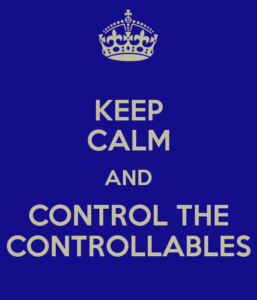By Rose O. Sherman, EdD, RN, NEA-BC, FAAN
I recently talked with a nurse leader who is very stressed about some upcoming organizational changes in her health system. She anticipates that the director she now reports to and feels much support from may no longer be in the position. She fears that things could change dramatically and not in a good way. Worrying about what will happen is causing her stress, exhaustion, and burnout. She has no control or input into who she may report to in the new reorganization.
In Burnout Immunity, a new book (and valuable resource) by Kandi Wiens, the author discusses the relationship between feeling in control and the development of burnout. Feeling a loss of control eats away at our sense of agency and can lead to helplessness and hopelessness. She recommends that one of the most powerful ways to protect yourself from burnout is to focus on what you can control and not dwell on things you can’t control.
This is important advice for the nurse leader in the above situation. She should consider what she has control over and what she does not.
The Controllable Things
- The leader can set boundaries around her work and between work and her personal life.
- The leader can focus on goals she establishes for herself and her unit.
- The leader can reaffirm her values and ultimately decide if the new reorganization is still congruent with her values.
- The leader can choose those in her organization with whom she wants to associate and consider her friends.
- The leader can make choices about where to put her energy at work.
- The leader can respond to challenges and make changes congruent with her goals, values, and beliefs.
- The leader can choose how vulnerable she will be in the face of change.
- The leader controls her actions, including what she does for self-care, how she reacts to events, and how much emotion she demonstrates.
- The leader controls her mindset and can choose to look at the situation positively or negatively.
- If a change is made, the leader controls how she treats others, including her new supervisor.
- The leader controls her self-talk and rumination about events that may occur.
- The leader controls whether she will remain in the position or stay with the organization.
The Uncontrollable Things
- Strategic decisions made by her organization, including who she may report to and any downsizing or her responsibilities.
- The leader does not control how the organization treats her current supervisor during a reorganization.
- The leader does not control budget cuts that may occur.
- The leader does not control changes that could happen in the organizational culture of her health system.
- The leader does not control how a new supervisor will evaluate her efforts.
- The leader does not control other people’s feelings, thoughts, actions, and reactions.
Self-regulation is a powerful force in the face of significant change and potential upheavals. This leader will be able to leverage her own skills and resources to manage the stress of pending events. All you can do when you face these situations is control the controllable.
© emergingrnleader.com 2024
Brand New Workshop for 2024 – Leading in the New World of Work. Click on Flyer The New World of Work Workshop
Bring the Nurse Leader Coach Workshop to Your Facility Virtually or Onsite. Click Here for the Nurse Leader Coach WS Flyer
New Offering – Redesigning Care Delivery Strategic Planning Session for Your Leadership Team – Click Here for Flyer
Rebuilding Your Nursing Team in 2024: Tactics to Work Better Together – Click Here for the Flyer
Now Available at Amazon and all Major Book Sellers




 LinkedIn
LinkedIn Instagram
Instagram